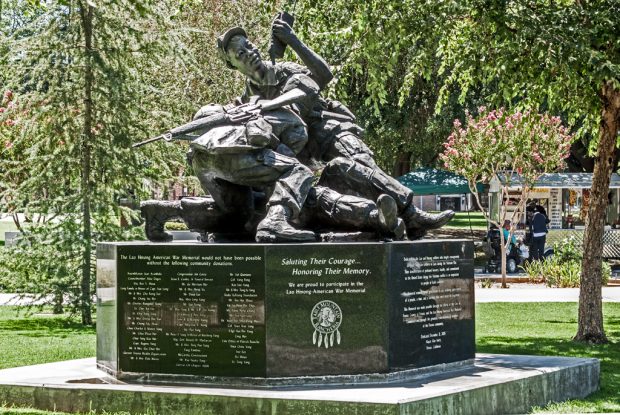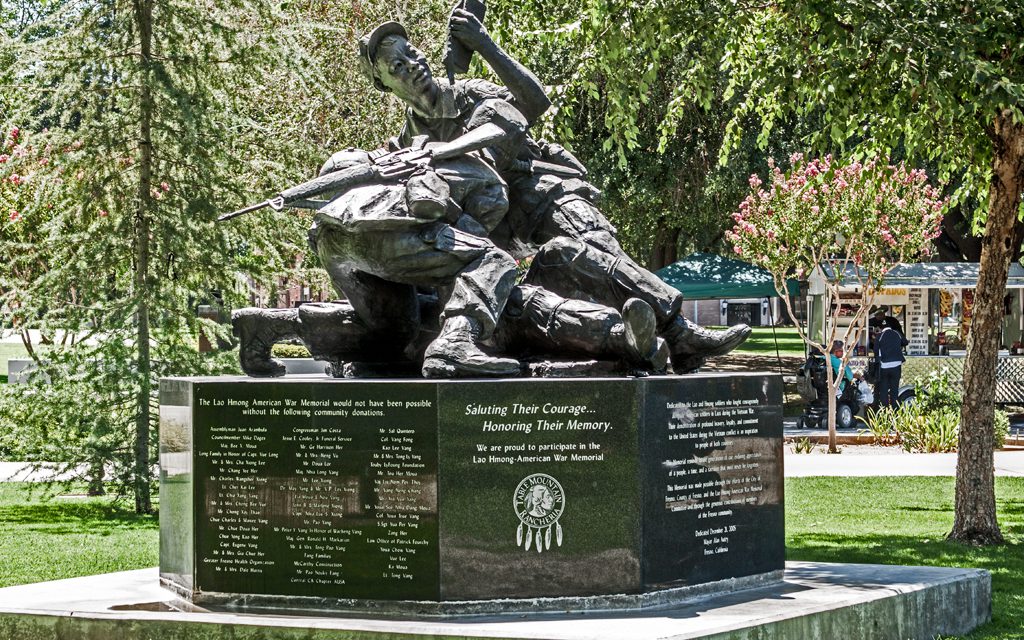 Carpe Hnub
Carpe Hnub
by Guy Stewart
The seasons in Minnesota were confused. The women had planted according to the sun, yet there was snow on the ground.
Shaking his head, Xiong Lomong swept the thin layer of spring snow from his driveway. The whisk of straw on concrete and crumbling asphalt was the only sound. He flipped the dirty snow and stones onto his neighbor’s grass. He knew it bothered the man. But he had given ten years of his youth to the Secret War, and American CIA in Vietnam and Laos. When they had lost their war and retreated, he had lost everything. There had been no compensation but the invitation to live in America, thought the stipulation had been to remain silent. He had, but now allowed himself to take this tiny payment from his neighbor.
Killing the man’s grass did not make his heart race as killing men had, but he was neither young nor at war. Lomong’s war was long past. Grass, fish, and chickens were the only things he killed these days, aimless in his adopted home.
Here forty years, there was much he still did not understand America. Some things that were clear. Americans had fought for a free Laos. They had lost. Americans and Hmong had died. His children; his grandchildren; his soon-to-be-born-great-grandchildren would be rich; would be free; would be safe.
He looked up as raucous noise scratched the face of the quiet morning. Thumping music, a US Army-style Hummer rolled slowly down the street, snow squeaking beneath its tires. The window rolled down. The music grew louder and the smiling young driver with the absurd glasses called in Hmong, “Ready to go, Honored Uncle, or will I have to wait an hour for you to get your gear?”
Lomong winced. The boy had his Honored Aunt’s voice. Carrying the broom up to the steps, Lomong leaned it against the trellis that would hold hot peppers at the end of August. Collecting his fishing pole and gear, he went to Foung Cha’s truck, placed his gear on the back seat then climbed in.
The younger man turned off the noise and said, “Do you really want to do this, Honored Uncle?”
Lomong paused before saying, “The Chinese watched us. The French watched us. The Vietnamese watched us. The Laotians watched us. The Thai watched us. Now, the Americans watch us and I want it to stop.”
Cha nodded, saying, “They’re watching you because you worked for the CIA, uncle.”
“I only work for myself now,” said Lomong.
“You only work for yourself now,” echoed Cha. He turned on the music again, singing an American song as they pulled away.
They drove to the park with the old dam, arriving as the sun cleared the eastern bank. No one else fished from the deck at the end of the steep asphalt trail. “I can’t believe they listened to me,” Cha said, his breath a white cloud in the cold air.
Tan and blue birds with sharp tails skimmed the river; higher up a white-headed eagle hovered. Smaller things that were not birds darted back and forth over the water. From the deep and deceptively calm lake on one side of the dam, mechanical flyers with tiny propellers swept over the roaring waterfall on this side of the dam. Lomong said, “Who listened to you?”
Cha touched the side of his absurdly thick glasses, watching the flyers and said, “Everyone I texted. I told them to stay away this morning.”
Lomong leaned over the edge, readying his pole and preparing to bait his hook. Below, a carp’s head popped above the water then sank from sight. Shiny scales flashed in the bright sunlight. “The robots are not here,” he said, using the English word. There was no Hmong equivalent for the mechanical creatures.
Cha laughed, “Robocarp’s here Uncle.” He picked up his pole and cast out into the Mississippi. Reeling in the line slowly, he pulled it up. A head with metallic scales popped up then submerged. The reflection was different. Cha said, “See?”
“Now I do.” Lomong reached into his bait bucket and grabbed a hard piece of plastic. He threaded the hook through a small ring, then dropped his line into the slapping, foamy water directly below the deck.
Cha looked at him, grinning hugely, then put a different object onto his hook. When he cast, his line went into the air.
Lomong again reflected that his brother allowed his children too much freedom. They acted as if they had been Americans forever. When Lomong had noticed the strange carp in the river, he knew it was the CIA. They knew the Hmong had worked for an old American regime, knew they fished the Mississippi and sent the robocarp to watch. When the youngsters discovered that they were being watched, they were outraged.
He understood rage very well.
The tip of Lomong’s pole bent a fraction. Something below was interested in the bait. He allow his mouth to turn up. Some Hmong had wanted to blow them up, others to shoot them. Lomong’s idea was to confound them, as Hmong had always done to those who watched.
Cha also had a bite. Reeling in one of the mechanical flyers, he had it on the deck and open in an instant.
Lomong set his hook and reeled in the robocarp. He tossed it down beside the flyer.
Cha swiftly opened a tiny door in the flyer. Leaning forward with slender forceps, he removed a piece just like Lomong’s bait. He set it beside the carp’s eye. Opening the eye of the carp, he removed an identical piece. He put the flyer’s piece into the carp, then the carp’s into the flyer, closing them both. He looked up and said, “Put it back.”
Lomong pulled the hook from the robocarp’s mouth and tossed it back into the river. Cha tossed the flyer into the air. It swooped low over the water, then was gone.
Lomong lowered his bait back into the Mississippi. Cha said, “Now we’ll find out what the CIA does with a flyer that wants to swim and a carp that wants to fly.” The old man managed a smile and a respectful nod. Cha’s words did not confuse him at all.


